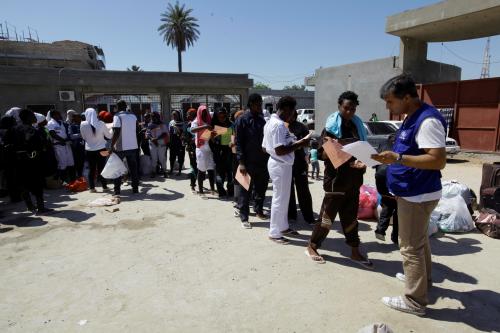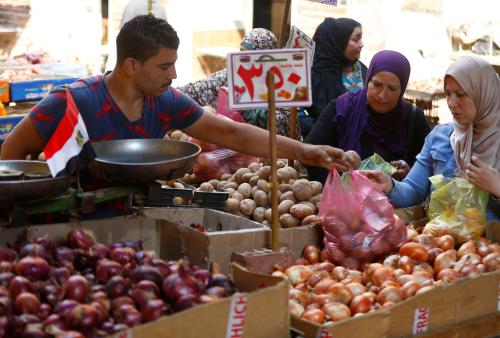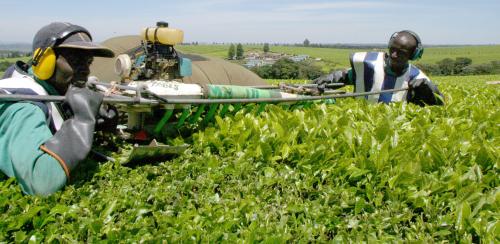Below is a viewpoint from Chapter 3 of the Foresight Africa 2018 report, which explores six overarching themes that provide opportunities for Africa to overcome its obstacles and spur inclusive growth. Read the full chapter on human development and poverty trends in Africa here.
Recognizing the importance of food and nutrition security (FNS) for improving public health, labor productivity, and economic growth, the world has committed to end all forms of hunger by ensuring access to sufficient and nutritious food for all people (Goal 2 of the Sustainable Development Goals).[1] Countries have made significant progress in their food security agendas by improving productivity and food production, addressing socio-economic, gender, and regional inequalities in access to food, and by building resilient agricultural practices.
Recent AGI research on food and nutrition security [2] has found that, despite much progress in Africa on these issues, environmental shocks and other vulnerabilities; resource constraints and inefficiencies; and policy implementation gaps threaten the progress and sustainability of FNS interventions.[3]
Progress on nutrition security in particular has lagged largely because it is a lot more complex. Indeed, some countries with sufficient food continue to have pockets of nutritionally insecure communities and sub-regions.
The high dependence on locally produced food limits dietary diversity, notably in settings where people primarily consume what they produce.
First, nutrition is cultural. Populations are pre-disposed to consume mainly what they produce locally. For example, compared to Ghanaians and Senegalese, Ethiopians are more predisposed to eat enjera than fish, dictated by food preference and geography. The high dependence on locally produced food limits dietary diversity. Rural households are particularly affected by high staple dependence and are vulnerable to unexpected drops in harvests.
In addition, nutrition security requires integrated program interventions beyond the agricultural sector. During our recent research and stakeholder interviews as part of select African cases studies in the Ending Rural Hunger project, we asked on-the-ground stakeholders about interventions they consider vital for nutrition security. The responses pointed to the importance of interventions in multiple sectors, including in infant and young child nutrition consultation, community-based nutrition programs, water, sanitation and hygiene, and health interventions.
Nutrition is also a science- and technology-intensive industry. Lack of qualified professionals in nutrition and the high turnover in staff of implementing public institutions are important constraints to achieving nutrition security. For this reason, a number of African countries rely heavily on external technical assistance.
Despite the complexity of addressing FNS, governments across Africa should continue to make this objective an important priority in development agendas given its importance for human capital development. Nutrition security does not necessarily require large investments. For example, well-organized campaigns to raise awareness on the importance of good nutrition, dietary diversity, and good hygiene for kids, mothers, and farmers can go a long way.
There also needs to be shift in mindset of both agricultural policymakers and farmers. Efforts on boosting productivity and food production need to embrace nutrition-sensitive agricultural practices by promoting the production of rich produce such as poultry and livestock, along with cereals. Educating farmers to consume these nutritionally rich products (not just sell them) may require integrating the work of agricultural development agents and health extension workers. The role of well-trained change agents is vital in settings where administrative structures are non-existent or barely functioning, particularly at lower administrative levels. Capacity building, through training change agents and ensuring implementing institutions are in place, is one of most pressing needs, as revealed in our stakeholders’ engagements.
The multi-sectoral coordination and horizontal accountability necessary to address nutrition security require coordination among multiple ministries and sectors like agriculture, health, education, industry, and water. Multi-sectoral initiatives tend to be more functional when participating sectors are accountable to a higher office.
Addressing FNS challenges in lagging regions and pastoral communities merits a separate approach ranging from getting the wage and benefits incentives right, to ensuring the presence of a sufficient number of qualified professionals, to designing livelihood and culturally sensitive FNS strategies.
Finally, to close the knowledge and policy gaps in the sector, collecting national, subnational, and household data on a regular basis, creating a unified nutrition database and establishing knowledge-sharing platforms among key national and international implementers are all vital. Data collected on major programs will allow for rigorous impact evaluation and ensure that FNS policies are evolving in the right direction.
Filling knowledge, technology, and policy gaps and supporting capacity building represent complementary investments to achieve Africa’s FNS agenda.
footnotes
1. According to the Food and Agriculture Organization’s 2009 definition, “food security” exists when all people, at all times, have physical, social and economic access to
sufficient, safe and nutritious food to meet their dietary needs and food preferences for an active and healthy life (FAO, 2009). The most comprehensive measure of food
security includes food availability, accessibility, stability, and utilization dimensions. The most severe form of food insecurity is typically associated with the possibility of
being hungry but unable to eat due to lack of money or other resources (FAO, 2016).
2. Nutrition security is a result of improvements in both nutritional status (hence of food security) and health status. Malnutrition is the most commonly used measure of
nutrition insecurity. The United Nations Standing Committee on Nutrition (UNSCN) recommends the use of ‘Food and Nutrition Security’ jointly, to facilitate integrated
actions. It proposes that “Food and nutrition security exists when all people at all times have physical, social and economic access to food, which is consumed in sufficient
quantity and quality to meet their dietary needs and food preferences, and is supported by an environment of adequate sanitation, health services and care, allowing
for a healthy and active life” (Wüstefeld, 2013).
3. The Global Ending Rural Hunger project of the Brookings Institution was one of the many initiatives that the year 2017 has seen in tracking progress in FNS through
desk review and stakeholder engagement of six African countries (Ethiopia, Ghana, Nigeria, Tanzania, Senegal, and Uganda). For more information, see the Ending Rural
Hunger website: https://endingruralhunger.org/.







Commentary
Foresight Africa viewpoint – Nutrition security: The last mile of Africa’s food security agenda
January 26, 2018